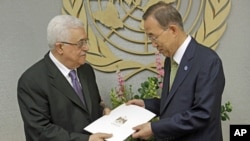The U.N. Security Council is considering a Palestinian application for full membership in the United Nations.
Many analysts say the Palestinians had no choice but to go to the United Nations seeking membership in the world body.
Carne Ross is a former British diplomat at the United Nations (now director of the ‘Independent Diplomat’, a non-profit advisory group) and an expert on the Middle East.
“The Palestinians would argue that there is no meaningful peace process at the moment - this is precisely why they were forced to take this step," said Ross. "They say that they have repeatedly asked Israel to sit down at the table, to discuss a two-state solution on the basis of the 1967 borders and a reasonable settlement on Jerusalem. And they say that Israel has basically refused to sit down on that basis. It is only willing to talk about a very, very limited deal and that has frustrated the Palestinians.”
Ross says others have a different view.
“The Israelis and the U.S. say, on the contrary, that this [Palestinian U.N. bid] is actually damaging to the peace process, that it reduces confidence between the parties and that essentially a deal needs to be done bilaterally between Israel and the Palestinians,” said Ross.
John Bolton, former U.S. ambassador to the United Nations, agrees.
“I don’t think it’s [Palestinian action at the U.N.] conducive to long-term stability in the Middle East or the resolution of the differences between Israel and the Palestinians," said Bolton. "I think the only way you create the circumstances for an agreed upon, lasting peace is for the parties themselves to negotiate. Nobody has any illusions about how hard Israeli-Palestinian negotiations are - but you certainly don’t make them any easier by trying something like this.”
Analysts say the key issues facing both sides are the geographic outlines of a new Palestinian state, the status of Jerusalem, the return of Palestinian refugees and the construction of Jewish settlements in occupied territories.
Peace talks ground to a halt last year when Israel resumed the construction of settlements after a moratorium expired. Palestinian officials say they will not resume talks until settlement building is stopped. Israel refuses to freeze settlements and is calling for talks without any preconditions.
Fawaz Gerges is a Middle East expert with the London School of Economics says the building of settlements continues.
“And that’s why the Palestinians are terrified. By the time they’ll sit down [to negotiations], there will be no land left to build a viable Palestinian state,” said Gerges.
As the Palestinian bid for full U.N. membership winds its way through the Security Council process, which may take weeks if not months, the so-called “Quartet” - made up of the United Nations, the European Union, the United States and Russia - is trying to come up with a negotiating framework acceptable to Israelis and Palestinians.
Khalid Elgindy, former adviser to the Palestinian government on negotiations with Israel, says a new approach is needed taking into account the situation in the West Bank and the Gaza Strip. The West Bank is run by Mr. Abbas’ Palestinian Authority while the Gaza Strip is under the control of the militant group Hamas, considered a terrorist group by the U.S. State Department.
“Up until this very moment, the approach of the [Obama] administration and by extension the ‘Quartet’ is to treat the ‘peace process’ as though it were separate and distinct from the situation in Gaza, the situation with regard to Hamas, the division between Hamas and Fatah in the West Bank and Gaza - and that somehow you could compartmentalize all of these things, deal with the negotiations separately, in a vacuum - and that simply doesn’t work,” Elgindy said .
Elgindy says these issues must be integrated, interconnected so that you have a comprehensive and viable peace process dealing with all issues - regional and bilateral.


















